|
|
|
Sort Order |
|
|
|
Items / Page
|
|
|
|
|
|
|
| Srl | Item |
| 1 |
ID:
002549
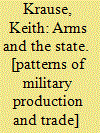

|
|
|
|
|
| Publication |
Cambridge, Cambridge University Press, 1992.
|
| Description |
xviii, 299p.,figures,tables
|
| Series |
Cambridge studies in international relations; 22
|
| Standard Number |
0521394465
|
|
|
|
|
|
|
|
|
|
|
|
Copies: C:1/I:0,R:0,Q:0
Circulation
| Accession# | Call# | Current Location | Status | Policy | Location |
| 033877 | 338.47623/KRA 033877 | Main | On Shelf | General | |
|
|
|
|
| 2 |
ID:
006303
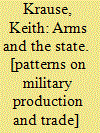

|
|
|
|
|
| Publication |
Cambridge, University Press, 1995.
|
| Description |
xviii, 299p.,figures and tables
|
| Standard Number |
0521558662
|
|
|
|
|
|
|
|
|
|
|
|
Copies: C:1/I:0,R:0,Q:0
Circulation
| Accession# | Call# | Current Location | Status | Policy | Location |
| 037620 | 338.47623/KRA 037620 | Main | On Shelf | General | |
|
|
|
|
| 3 |
ID:
092121
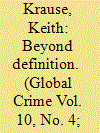

|
|
|
|
|
| Publication |
2009.
|
| Summary/Abstract |
While conceptualising violence - in either minimalist or comprehensive understandings - has posed significant problems for scholars, the problem of measuring or quantifying it has been equally challenging for both researchers and policy makers. This article examines the best available current evidence on the 'global burden of armed violence' and highlights what we know and do not know about the scope, scale, and distribution of different forms of violence worldwide, especially what policy makers have called 'armed violence' (the minimalist conception). It also examines the definitional and conceptual constraints that challenge any attempt to develop cross-national and cross-cultural comparisons, and the limitations of existing data, and brings the empirical evidence to bear on the conceptual debates that animate this volume. Finally, it raises some questions concerning the way in which the different forms that violence takes may (or may not) be linked, and the issues this raises for future 'global' comparisons.
|
|
|
|
|
|
|
|
|
|
|
|
|
|
|
|
| 4 |
ID:
086199
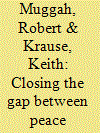

|
|
|
|
|
| Publication |
2009.
|
| Summary/Abstract |
This article highlights how the instruments for addressing the presumed source(s) of armed violence need to be sharpened and extended to address the heterogeneous character of armed violence present in many post-conflict situations. These extensions require the development of practical armed violence prevention and reduction programmes that draw upon scholarship and practice from the criminal justice and public health sectors. The article argues that reducing organized violence and insecurity in post-conflict contexts requires responding to the wider dynamics of armed violence rather than focusing exclusively on insecurity directly connected to what are traditionally defined as armed conflict and post-conflict dynamics; and this requires attention not just to the instruments of violence, but also to the political and economic motives of agents and institutions implicated in violent exchanges at all levels of social interaction.
|
|
|
|
|
|
|
|
|
|
|
|
|
|
|
|
| 5 |
ID:
165327
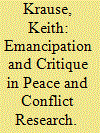

|
|
|
|
|
| Summary/Abstract |
This contribution examines how the critical potential of research on peace in International Relations has been simultaneously marginalized and transformed. It briefly traces the evolution of peace research, as well as choices, contestation, and breaks in the construction (and “disciplining”) of peace and conflict research. It then focuses on two epistemological and normative choices that occlude the emancipatory potential of peace research and marginalize certain approaches to the study of the causes of war and conditions of peace. In a more positive vein, it illustrates, with examples from recent research, where potentially emancipatory or transformative scholarship on building peace has migrated.
|
|
|
|
|
|
|
|
|
|
|
|
|
|
|
|
| 6 |
ID:
147561
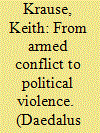

|
|
|
|
|
| Summary/Abstract |
Most contemporary lethal violence does not occur in conflict zones, the majority of states most affected by lethal violence are not at war, and the levels of lethal violence in many nonconflict settings are higher than in war zones. Much of this nonwar violence is organized, not random, and political in nature. A narrow focus on wars and formal armed conflicts thus obscures the high levels of everyday violence and insecurity around the world. This essay makes the case that adopting a broad understanding of political violence – including violence committed by the state and its agents, and nonphysical violence as the violation of basic rights – is essential to gain insight into the causes and consequences of, and to frame appropriate responses to, war and violence in the twenty-first century.
|
|
|
|
|
|
|
|
|
|
|
|
|
|
|
|
| 7 |
ID:
110235
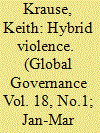

|
|
|
|
|
| Publication |
2012.
|
| Summary/Abstract |
This article unpacks the notion of hybrid violence and sketches the different forms of hybrid violence-categorical, institutional, motivational, and temporal-that can be found in many postconflict contexts. It highlights how attempts to establish a monopoly over the legitimate use of force are often at odds with the various roles that violence plays in contemporary states, especially (but not exclusively) in postconflict contexts. The article argues that in fact many of the shortcomings of the liberal peacebuilding paradigm stem from a failure to recognize that a hybrid political order existed before conflict erupted and that hybridized forms of violence were a critical element in shaping conflict dynamics in many postcolonial states.
|
|
|
|
|
|
|
|
|
|
|
|
|
|
|
|
| 8 |
ID:
090429
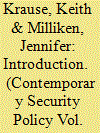

|
|
|
|
|
| Publication |
2009.
|
| Summary/Abstract |
The study of non-state armed groups (NSAGs) has traditionally been limited to those actors with a political agenda that pose a specific threat to the state and undermine its ability to claim a monopoly over the legitimate use of force within its territory. In contrast, this introduction - and the articles that follow - expands upon this narrow conceptualization and redefines NSAGs to encompass such actors as militias, warlords, private security providers, urban gangs, and transnational and criminal networks. This understanding facilitates a wider exploration of how such groups form in relation to the state, and how the state in turn is shaped through its interactions and conflict with the armed group(s). This article provides an overview of a set of research issues, frameworks, and methods that represent a starting place for a broadened agenda on armed groups which moves beyond those actors who mount direct challenges to the Weberian state. A more nuanced understanding of the different forms and historical trajectories of the interactions between armed group and states also highlights the dynamics through which various types of violent actors influence the use of force and violence in contemporary world politics.
|
|
|
|
|
|
|
|
|
|
|
|
|
|
|
|
| 9 |
ID:
104992
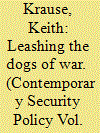

|
|
|
|
|
| Publication |
2011.
|
| Summary/Abstract |
The progressive development of measures to control weapons of mass destruction in the 1980s and 1990s moved arms control beyond a sovereign conception, towards a larger logic of governmentality that reaches deep into the domestic affairs of states and involved forms of regulation and control that went far beyond inter-state agreements to regulate their military competition. The article first focuses on the larger historical process of controlling arms, understood as a technology of social and political control designed to manage and channel the use of violence both within and between states. In this sense, the Cold War arms control paradigm represented both a shift in, and continuity with, historical arms control experiences. But by representing itself as a set of instrumentally-rational techniques for managing conflict, arms control throughout the Cold War normalized a particular set of practices as the only proper way of dealing with a subset of the larger issue of how to 'control and regulate the possession and use of the means of violence'. Many contemporary security-building practices that are not thought of as arms control share its same logic, but move towards a more governmental mode of exercising the control in arms control, focusing as much on institutions and individual wielders of violence as on the instruments of violence themselves.
|
|
|
|
|
|
|
|
|
|
|
|
|
|
|
|
| 10 |
ID:
185795
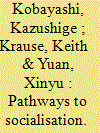

|
|
|
|
|
| Summary/Abstract |
This article problematises the status quo bias in IR socialisation research, and develops an alternative concept of competitive socialisation, through which subaltern actors internalise dominant norms, enhance their competitive edge, and enact more equalised power relations in global politics. The dominant strand of IR socialisation research mostly conceives of socialisation as a status-quo-oriented practice that reinforces the existing power hierarchy, such as teacher-student relationship. This has resulted in a one-sided theory neglecting the importance of proactive and self-directed socialisation efforts embarked upon by subaltern actors themselves. Based on an alternative sociological approach that defines socialisation as a practice of self-enhancement, this article develops the concept of competitive socialisation and articulates alternative pathways to the internalisation of dominant norms. It applies this framework to the cases of Chinese socialisation into the peacekeeping community, and Russia's socialisation into the multilateral development community. These case studies demonstrate that the holistic internalisation of dominant Western norms has enabled Beijing and Moscow to challenge the existing global power hierarchy. This, in turn, resulted in fundamental changes in their behaviours from initial norm rejection, to passive acceptance, and finally to active learning and norm internalisation.
|
|
|
|
|
|
|
|
|
|
|
|
|
|
|
|
| 11 |
ID:
187149
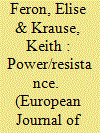

|
|
|
|
|
| Summary/Abstract |
Peacebuilding policies and practices represent strong attempts by external actors to exercise power in postconflict settings. Yet the extensive theoretical treatments of power in International Relations remain somewhat disconnected from empirical analyses of peacebuilding, and how external actors exercise power is under-conceptualised in the literature. Likewise, the literature on forms of resistance by local actors is seldom examined as an exercise of power in itself, and as part of a multidimensional relationship of power/resistance between external and local actors. This article thus theorises the different dimensions of power/resistance, with a detailed focus on an exemplary case – international efforts at peacebuilding in Burundi – that spans more than twenty years. It deploys a tripartite conception of both to analyse the ways in which different forms of power and resistance can be uncovered in peacebuilding practices, We demonstrate this via an analysis of postconflict peacebuilding in Burundi, and in particular the longer-term efforts of local actors to overtly and covertly bend and fuse peacebuilding practices to their own ends.
|
|
|
|
|
|
|
|
|
|
|
|
|
|
|
|
| 12 |
ID:
057182
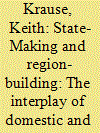

|
|
|
|
|
|
|
|